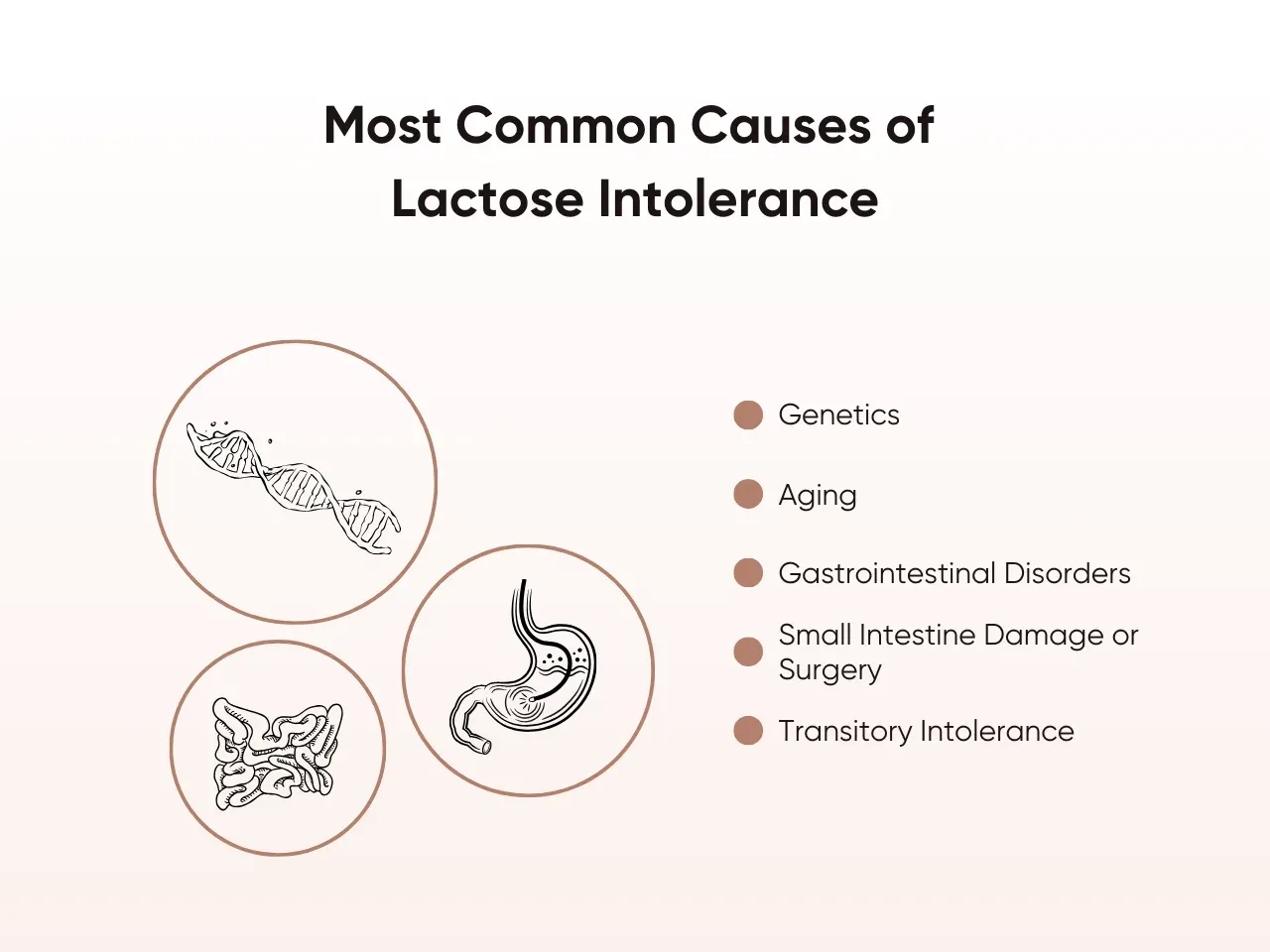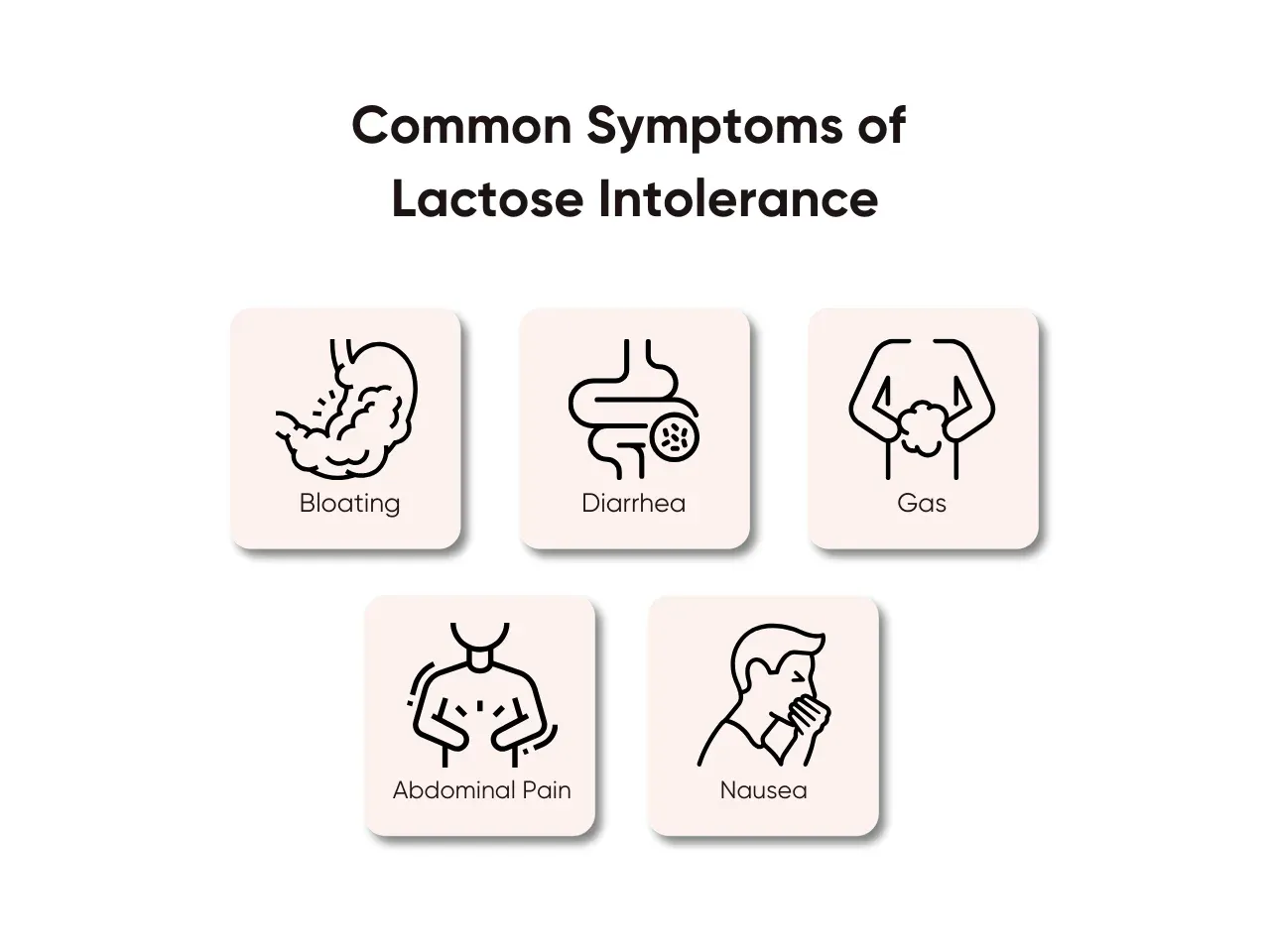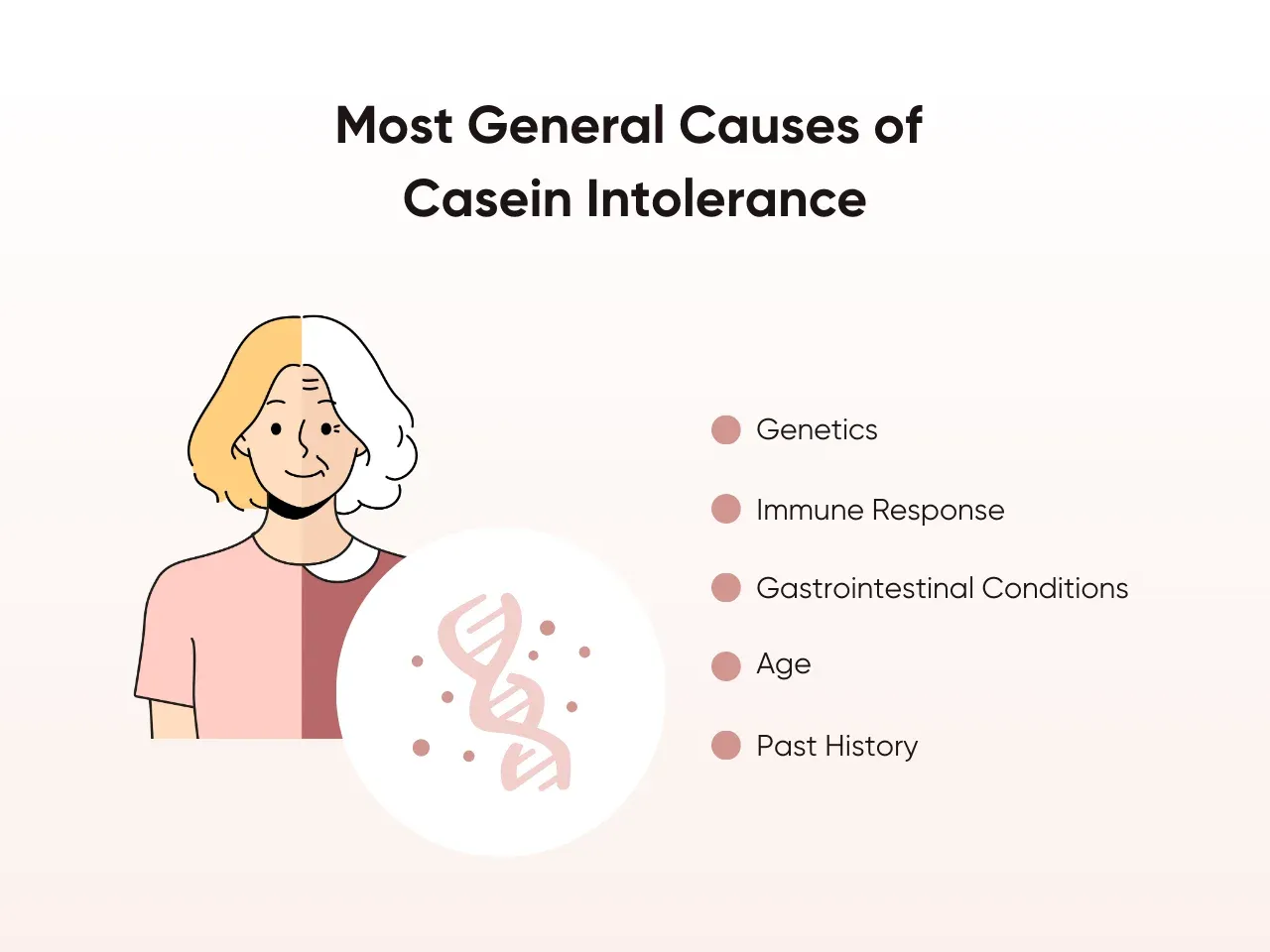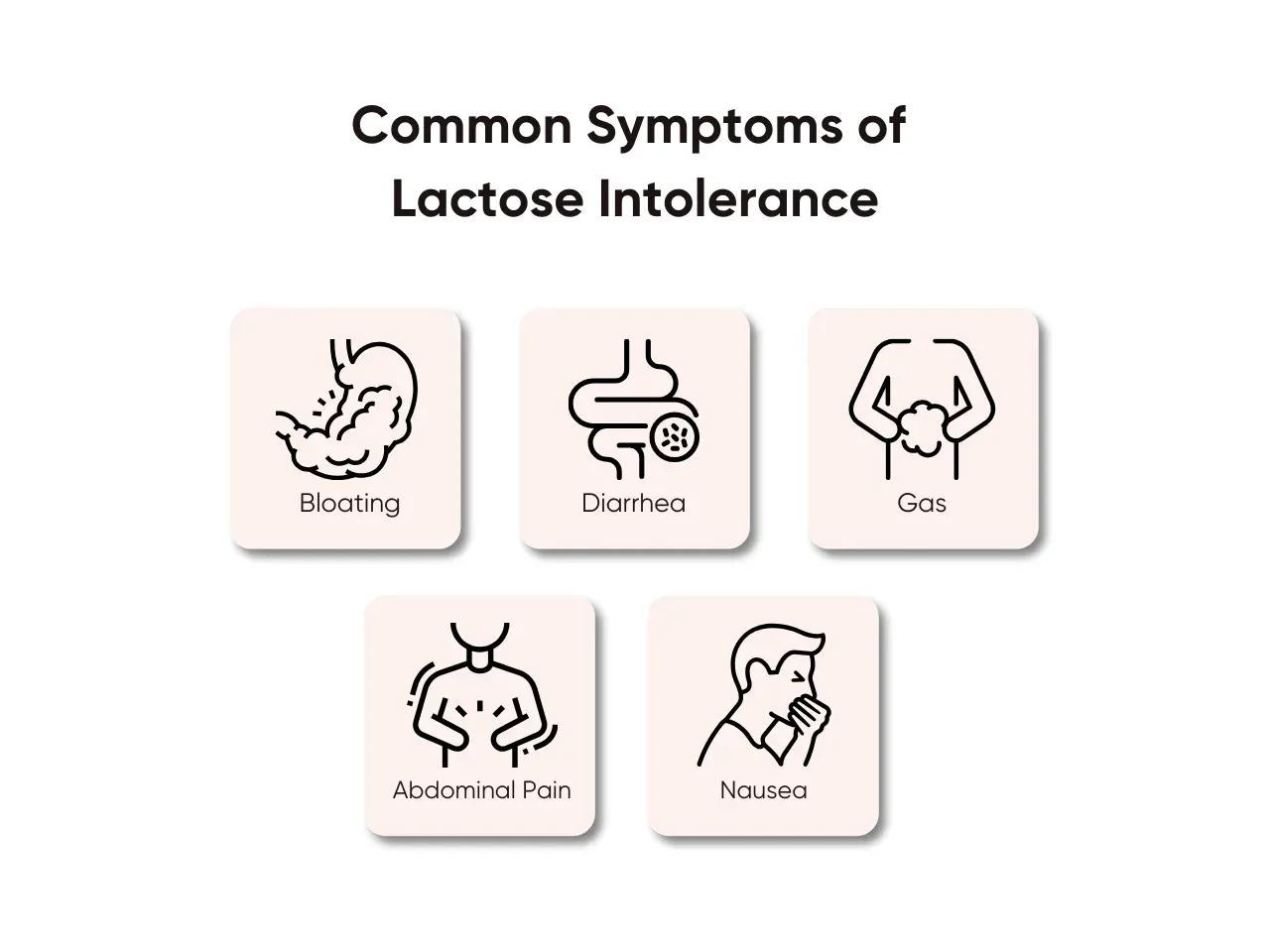Casein Intolerance vs. Lactose Intolerance: What Are The Differences?
Differentiate between casein intolerance vs lactose intolerance. Explore symptoms of casein allergy, sensitivity, and more on our blog.

Digestive health issues are becoming increasingly common, affecting many people worldwide. Among these concerns, intolerances to specific food components, particularly dairy, are frequently reported. Casein intolerance vs. lactose intolerance are two common conditions that lead to discomfort and several digestive problems, but they each have different root causes. Understanding these differences is significant in handling symptoms.
Milktab boasts the best lactose intolerance pills to help you enjoy dairy without discomfort. They contain three times the lactase enzyme at 27,000 FCC units. Two more enzymes, protease and lipase, complement them for optimal digestion. The slimmer design measures 0.2 inches, so they fit perfectly into any wallet. They are the total on-the-go solution for people with lactose intolerance.
With our in-depth knowledge of lactose intolerance and other types of intolerance, we prepared this guide to help you wade through casein intolerance vs. lactose intolerance. In the end, you will understand how each condition affects the body and how to manage your dietary choices effectively.
Let’s dive in!
What is Lactose Intolerance?
Lactose intolerance is a common health issue that affects many people worldwide. It occurs when the body can’t properly digest lactose, a sugar in dairy products. Let's examine its causes and symptoms to understand the differences between casein intolerance vs. lactose intolerance.
Definition and Causes
Lactose intolerance is the inability of an individual to digest lactose, a sugar in milk and its products. It is caused by insufficient lactase production by the small intestine, the breaking enzyme necessary to break up the lactose.
In exchange, it builds up in the colon and offers awful symptoms. Several diagnostic tests for lactose intolerance include the hydrogen breath and lactose tolerance tests. Some of the most commonly suggested causes of lactose intolerance include the following:

- Genetics: Lactose intolerance is mostly but not always a hereditary condition. Even though most people are born with the ability to produce the enzyme.
- Aging: As age increases, the body produces less lactase. The natural decline in enzyme lactase production makes it difficult for adults to digest lactose.
- Gastrointestinal Disorders: Crohn's and celiac disease can impair the small intestine. Impaired small intestines may have low lactase levels and consequently suffer lactose intolerance.
- Damage to or Surgery in the Small Intestine: Damage or surgery to the small intestine may cause an inability to produce lactase. If either surgery or physical injury damages the tiny intestine, it won't be able to digest the lactose.
- Transitory Intolerance: Some people's lactose intolerance may be reversed after an infection, such as gastroenteritis. Their bodies become normal again as the gut recovers and begins producing more lactase enzymes.
Common Symptoms of Lactose Intolerance
Generally, the common symptoms of lactose intolerance manifest from as early as 30 minutes to within 2 hours after consuming dairy products. Since the body cannot metabolize lactose, discomfort may also come with digestive problems.
People can experience different symptoms, and the severity of the attacks will vary with each individual's tolerance level. The level of intensity varies depending on the amount consumed from one individual to another. Generally, the common actual milk allergy symptoms are as follows:

- Bloating: Many people experience bloating, a feeling of fullness or swelling in the abdomen. This is due to the fermentation of undigested lactose that builds gas in the intestines.
- Diarrhea: Diarrhea is one of the most common symptoms and can occur as a reaction of the body to flush out the undigested lactose. In the intestines, lactose draws water into the intestines, resulting in soft stools.
- Gas: The tummy produces too much gas from the fermentation of lactose by the colon bacteria. This often culminates in flatulence and can result in dramatic suffering from the attacks.
- Abdominal Pain: This usually involves cramping or sharp stomach pain. This ache is generally caused by gas formation and the body's reaction to undigested lactose.
- Nausea: The stomach may react with nausea or upset by consuming dairy. This results from the discomfort caused by gas, bloating, and other issues in the digestive system.
Managing Lactose Intolerance
Dietary changes can help manage lactose intolerance. You can use lactose-free products like milk, cheese, and yogurt, but always check food labels to ensure they don't contain hidden sources of lactose. This can help prevent symptoms while still enjoying dairy. The next option uses plant-based alternatives, including almonds, oats, and soy milk.
Another option is taking dairy digestive supplements like lactase enzyme drops or lactase chewable tablets before dairy consumption. The enzyme supplements allow your body to break down lactose, making it less challenging to digest. These simple adjustments highlight the differences in management strategies for casein intolerance vs. lactose intolerance.
What is Casein Intolerance?
Casein intolerance is when your body fails to break down casein, a protein in milk or other dairy products. Signs of casein intolerance include digestive issues, headaches, or skin reactions. To better understand casein intolerance vs. lactose intolerance, let’s take a closer look at what it is and how it affects the body.
Definition and Cause
Unlike lactose intolerance, which involves sugar digestion, casein intolerance affects how the body processes protein. This milk protein intolerance can produce numerous symptoms, such as disorders in the gut, skin rashes, or respiratory problems. The most general causes of casein intolerance are:

- Genetics: Some are genetically disposed to reduce the breakdown of casein. Family histories may come with this.
- Immune Response: For some, it might cause an immune response, which presents different symptoms and inflammation within a person's body. It's not an allergic reaction to dairy.
- Gastrointestinal Conditions: Conditions like irritable bowel syndrome (IBS) can affect how the body processes proteins, including casein. This may increase sensitivity to dairy products.
- Age: Over time, older people need to be more efficient in digesting most of the proteins taken into their bodies. This means that intolerance to casein is more likely among older people.
- Past History: Overconsumption of milk products over a protracted period can aggravate the condition. The body gradually becomes incompetent in digesting casein, which may be the causative factor in experiencing intolerance symptoms.
Symptoms of Casein Intolerance
Casein intolerance vs. lactose intolerance differs in symptoms, though often overlapping, it differs in symptoms. Lactose intolerance primarily happens in the digestive system, but casein intolerance may lead to several reactions. The intensity of the symptom varies according to individual sensitivity to casein. Here are common casein intolerance symptoms:

- Abdominal Pain: Most people experience casein allergy symptoms, such as cramps or sharp abdominal pain, following consuming dairy products. The body fails to break down casein well, which leads to discomfort.
- Bloating: Obvious bloating is another milk protein allergy symptom. It is a feeling of fullness and swelling in the stomach caused by gas accumulating in the intestines.
- Skin Reactions: Some people develop food allergies after consuming dairy products, such as rashes, hives, or eczema. An immune system reaction against casein causes most skin reactions.
- Headaches: Headaches can be caused by the intake of casein. Sometimes, this type of allergy is due to an inflammatory response and another systemic reaction provoked by the presence of the protein due to milk consumption.
- Respiratory Signs: Some patients with casein intolerance might present with severe nasal blockage, sneezing, asthma, or difficulty breathing. This is because their immune system is resisted by casein, which causes pain in the respiratory space.
How to Manage Casein Intolerance
Casein intolerance vs. lactose intolerance management is quite different. Casein protein intolerance is controlled by diet very carefully. Here are key steps to effectively manage casein protein intolerance through diet:
- Avoid All Dairy Products: Individuals with casein intolerance should strictly avoid foods containing casein, including all dairy products such as milk, cheese, yogurt, and items made from these ingredients.
- Use Plant-Based Alternatives: Replace dairy with plant-based options like almond milk, oat milk, coconut milk, and yogurt. These alternatives offer similar textures and flavors without any casein.
- Read Labels Carefully: Many processed foods may contain hidden casein, often listed as "milk ingredients," "milk protein," or "caseinate." Always check labels carefully to prevent accidental exposure.
Following these steps can help individuals with casein intolerance make safe dietary choices and manage their symptoms effectively.
Key Differences Between Casein Intolerance vs Lactose Intolerance
Understanding the difference between casein intolerance vs. lactose intolerance is essential for managing symptoms effectively. Each condition affects the body differently, requiring tailored dietary adjustments. Let’s explore the key factors that distinguish these two intolerances to help you make informed choices for better digestive health.
The Role of Enzymes vs. Proteins
Casein intolerance vs. lactose intolerance have different body responses. Lactose intolerance results from a deficiency of the enzyme required to break down the sugar in milk, known as lactose. When insufficient lactase, lactose moves into the colon undigested, leading to digestive complications.
On the contrary, casein intolerance reacts to casein, a dairy product protein—the failure of the body to break down the substance results in an immune response or other symptoms. Several issues can present, including gastrointestinal disorders, skin reactions, and respiratory symptoms.
Whereas lactose intolerance primarily targets the digestive system, casein intolerance often involves the immune system. Knowing the difference between casein intolerance vs. lactose intolerance can enable one to handle a person's symptoms.
Diagnosis and Testing
Casein intolerance vs. lactose intolerance requires different methods and tests. Doctors usually use particular tests when diagnosing lactose intolerance. These tests might indicate how the body will react to lactose. That way, a person can be determined whether he has difficulty digesting lactose. Here are the standard tests used to test for lactose intolerance:

- Lactose Tolerance Test: This is the best way to test lactose intolerance. It is designed to determine how efficiently your body can digest lactose. Immediately after you have taken the lactose-containing drink, blood samples are taken to check for your blood sugar levels. The inability to increase the level is an indication of dairy intolerance.
- Hydrogen Breath Test: This specific test measures the amount of hydrogen exhaled in the breath after some lactose intake. In cases of poor lactose digestion, hydrogen is released, which can be traced in the breath.
- Stool Acidity Test: This test is usually done in infants and children. Tests will be conducted to establish whether lactic acid and other acids are present in the stools, thereby proving lactose malabsorption.
Casein milk intolerance, however, requires a different perspective since it often falls under monitoring symptoms, such as removing dairy from the diet. Here are the tests to do for checking on casein intolerance:

- Elimination Diet: This process eliminates all dairy products for several weeks. If symptoms improve and return after introducing dairy, it suggests casein intolerance.
- Skin Prick Test: This test checks for allergic reactions to casein. Small amounts of casein are introduced to the skin. If a reaction happens, it might be an intolerance or allergy.
- Blood Tests: These tests detect the presence of antibodies specifically toward casein sensitivity. However, it's very rare to measure and use with other tests.
Knowing the difference between casein intolerance vs. lactose food intolerance diagnosis is essential to managing them efficiently.
Types of Dairy Products Affected
The difference between casein intolerance and lactose intolerance lies in the types of dairy products each affects.
- Lactose Intolerance: Lactose intolerance generally impacts high-lactose foods, making it difficult for individuals to consume milk, ice cream, and soft cheeses. However, lactose-intolerant individuals can often tolerate lactose-free milk, hard cheeses, and butter, as these products contain little to no lactose.
- Casein Intolerance: Casein intolerance affects most dairy products since casein is a protein found in all types of milk. People with casein intolerance need to avoid all dairy products, including milk, yogurt, cheese (both soft and hard), and lactose-free options, as they still contain casein.
Understanding the differences between casein intolerance vs. lactose intolerance helps many decide which dairy products suit their diet.
Key Takeaway
Knowing casein intolerance vs. lactose intolerance would help manage your digestive health. Both conditions have symptoms, causes, and dietary implications that could affect you daily. This is why knowing their differences will make you more aware of what to eat or avoid for comfort.
There are ways to enjoy meals without inconvenience, whether casein or lactose intolerance. You can also seek help through medical advice from a health professional who will inform you based on your requirements. Then, you would feel free and confident as you make choices in terms of your diet.
Are you tired of accommodating discomfort after treating yourself to dairy? Milktab will support you with potent lactase pills that help you indulge in your favorite dairy products without worry. With triple the lactase enzyme and additional digestive support, you can say goodbye to digestive issues. Contact us at contact@milktab.co and try Milktab today to reclaim your love for dairy!



